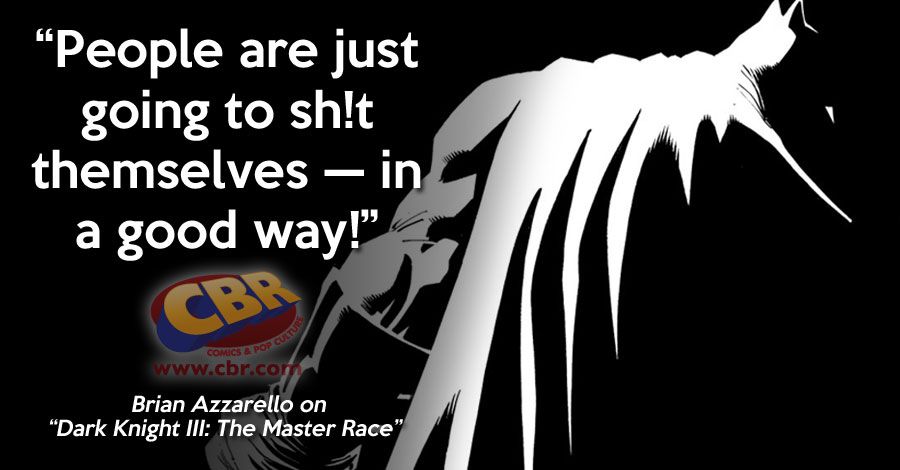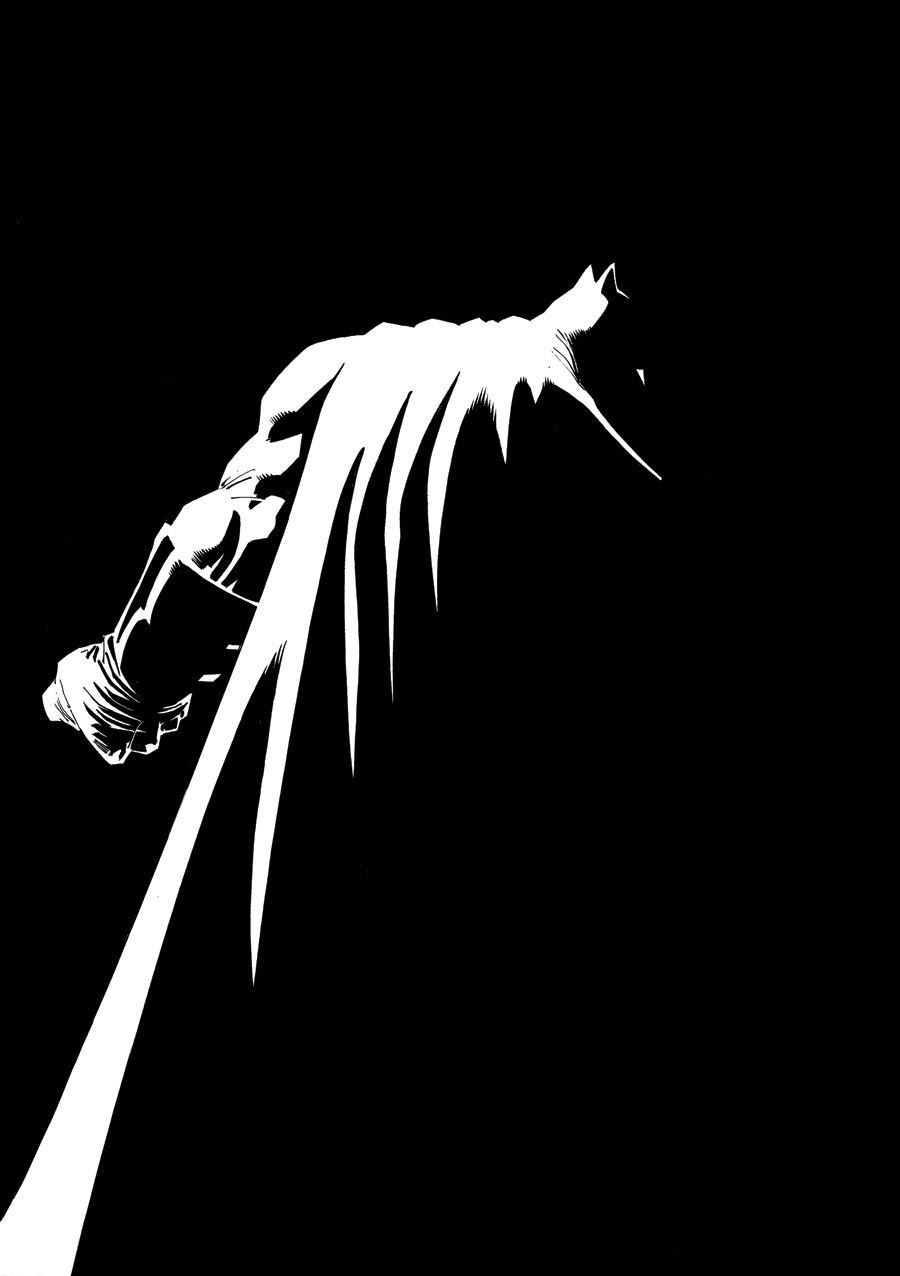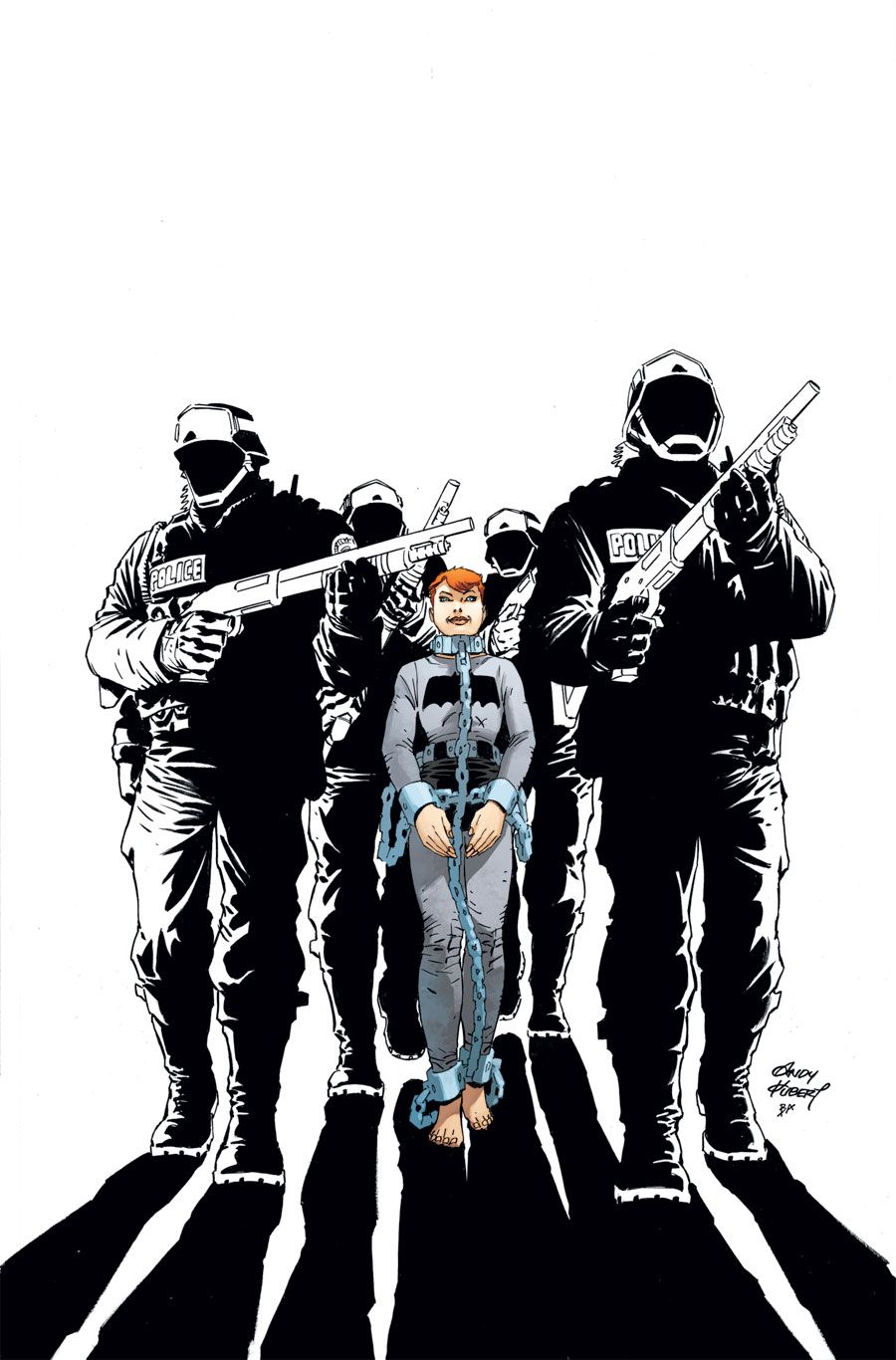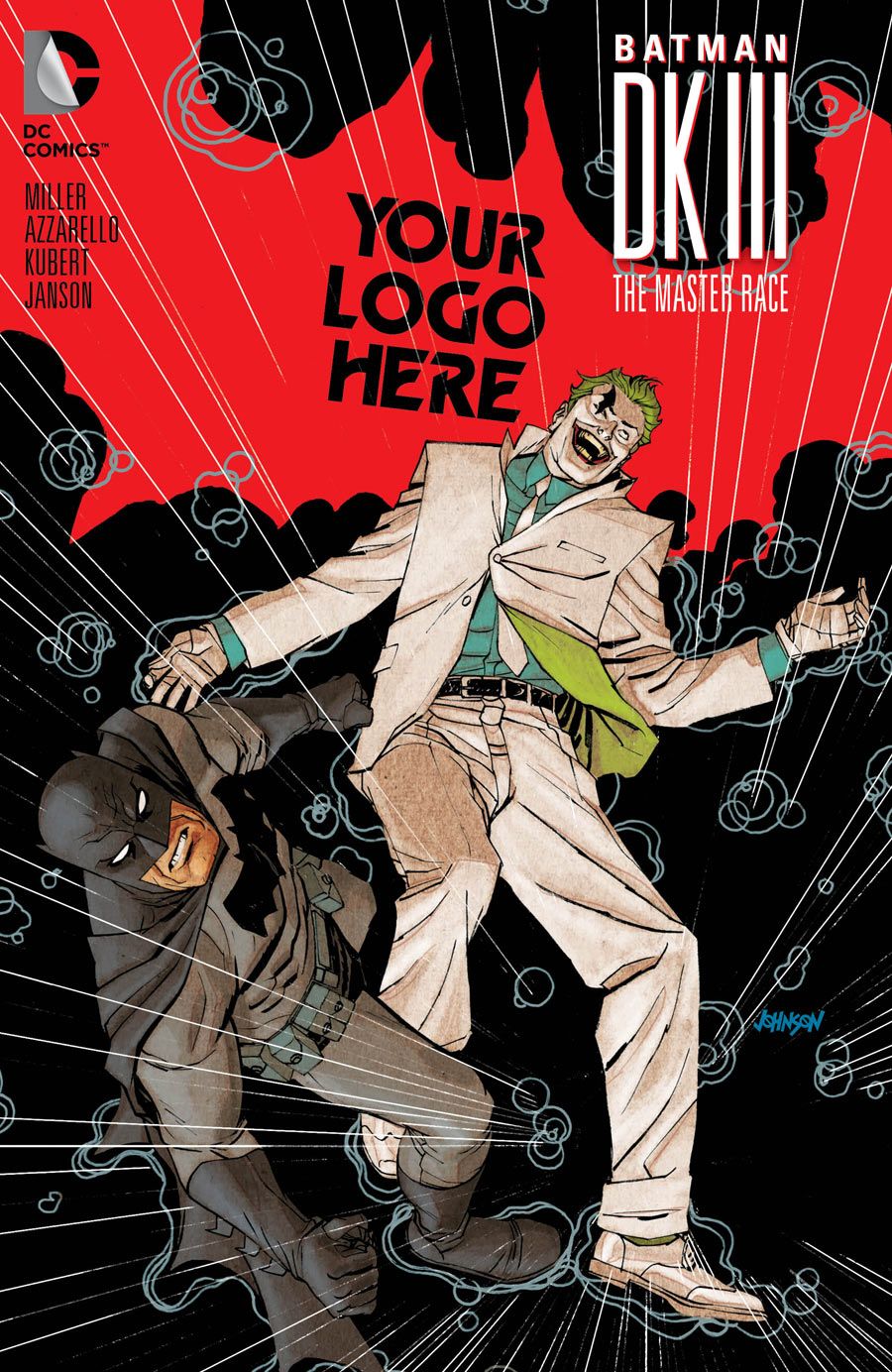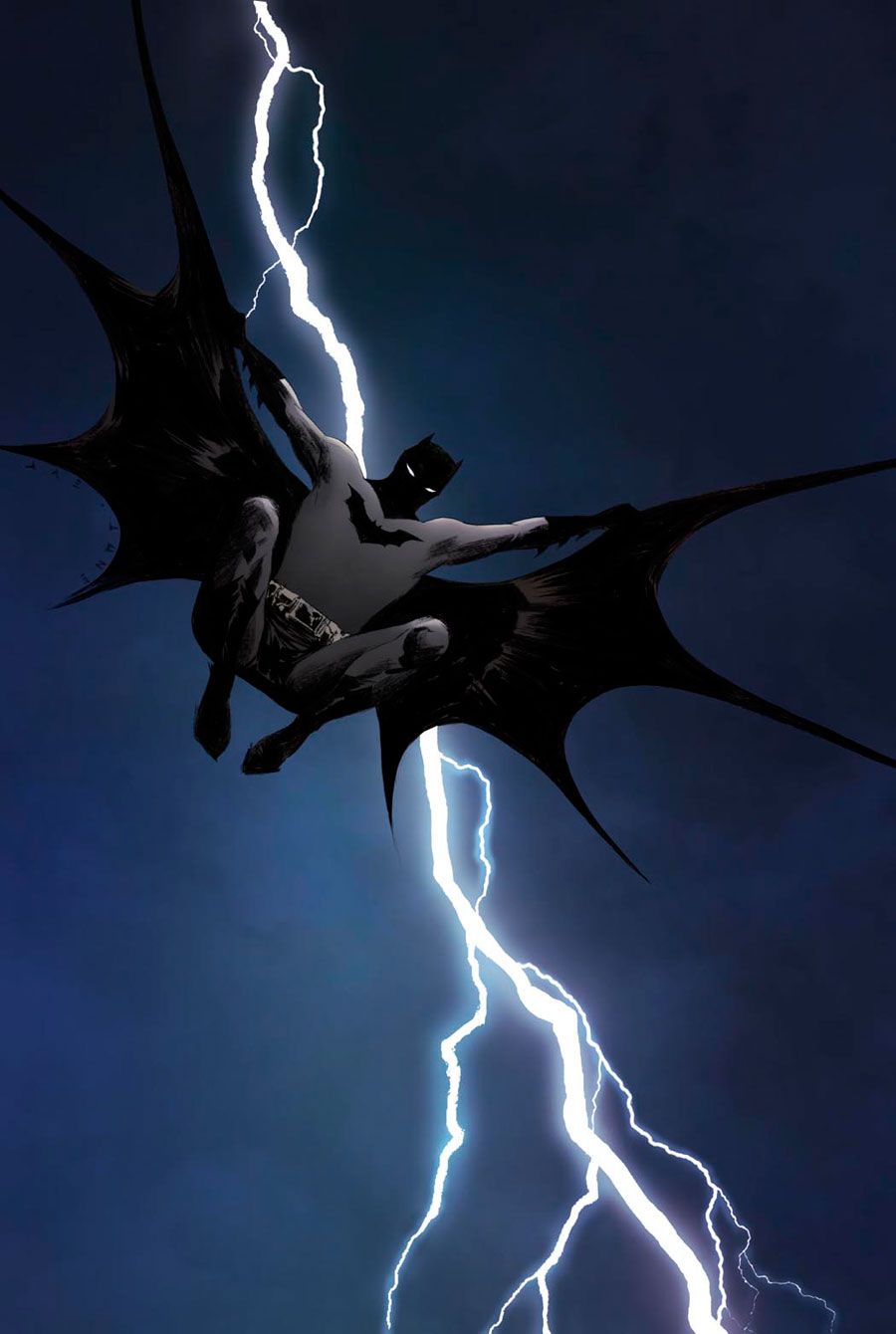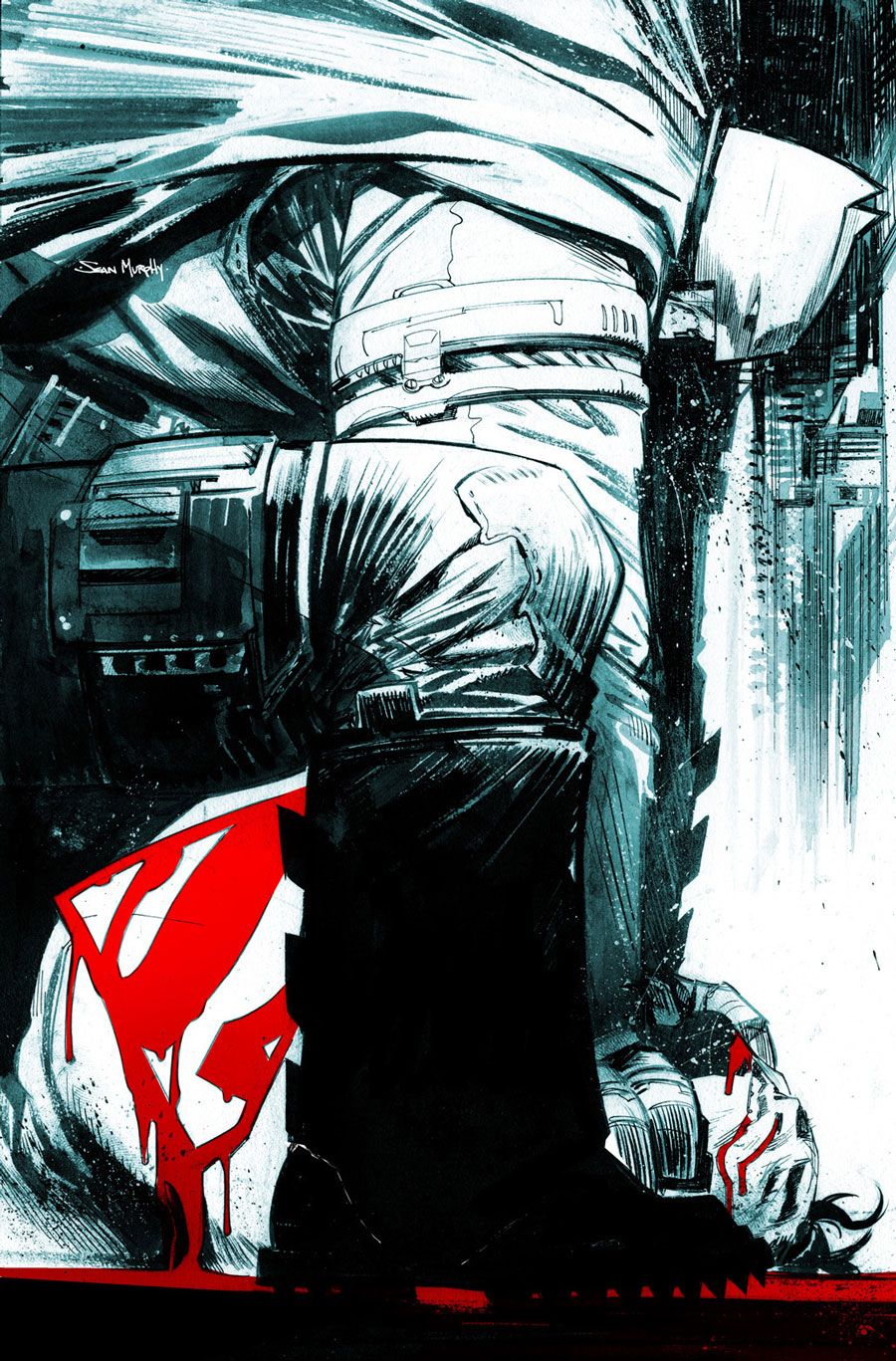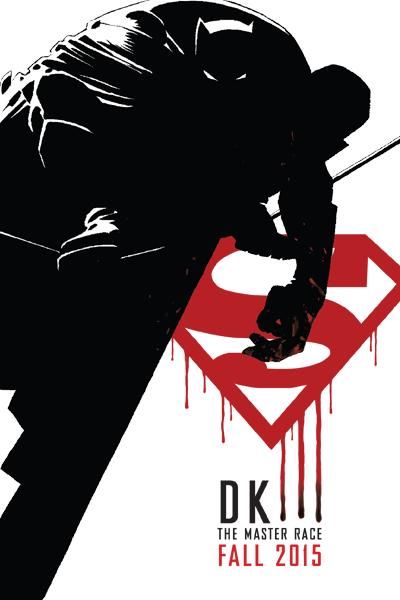This November, the Dark Knight is set to return for one final DC Comics story. "The Dark Knight III: The Master Race" is billed as the eight-issue conclusion of Frank Miller's story that started with 1986's "The Dark Knight Returns" -- one of the most highly influential superhero stories in history -- and continued in 2001-2002's "The Dark Knight Strikes Again;" presenting an older version of Batman coming out of retirement to confront a bleak future.
This time, Miller will be joined on writing duties by acclaimed writer Brian Azzarello. The story will be illustrated by veteran artist Andy Kubert, and Klaus Janson, who returns to the franchise after inking the 1986 original. Several as-yet unnamed guest artists will contribute to the series in the form of 16-page minicomics that will be bound inside each issue of "Dark Knight III," written by Miller and Azzarello and focusing on different character in the "Dark Knight" world. Other than that, not much has been revealed about the plot of the story, other than this brief solicitation copy for issue #1: "The Dark Knight rises again to face the dawn of the master race!"
CBR News sat down with Azzarello earlier this week at DC's Burbank headquarters to talk "The Dark Knight III: The Master Race." Though the writer declined to share much in the way of plot details, he spoke in-depth about his unique collaboration with Miller, which has involved multiple face-to-face writing sessions, complete with the writers acting out dialogue in different voices for each character.
"There is going to be some things in this series, people are just going to shit themselves," Azzarello told CBR. "In a good way."
CBR News: Brian, you've been working on "Dark Knight III" for almost a year at this point, right?
Brian Azzarello: Almost a year. We started right after New York Comic Con last year.
What has the experience been like -- collaborating with Frank Miller on this level?
It's been a blast! I've known Frank for a long time. I think he's funny; he thinks I'm funny. We're probably the only two people that think that about each other. [Laughs] We make each other laugh. We've had a really good time -- I go over there, we shoot the shit, it's fun. We do voices. When we're talking through the script, he'll take the Batman character, and I'll take another character.
What voices do you do?
I've done Superman, I think I've done Carrie a few times. He's done Carrie. I've done Batman, too.
That' sounds like a very close collaboration -- not only are you writing together, but you're actually getting together in person, instead of doing this over email. What has that been like, and how rare is it for you?
I've never, ever worked on anything like this before. But it's been really great. It's been a real learning experience. He has a different way of structuring a story than I do. He goes for moments -- moment, moment, moment. I'm more, "Here's our ending, let's seed things along the way to get us to our ending." It's just a different way of approaching things. It's been really great blending those two ways of working together.
Has this taken up most of your creative energy? It's definitely an ambitious project, given its profile and the length of each issue.
Yeah, it has; for the last year.
Not a bad thing to be focused on.
No. When I'm done with it, I get my life back. [Laughs]
You mentioned knowing Frank for a while -- how far back do the two of you go as friends?
Man, I think "100 Bullets" was maybe going a year or two when we met.
So around 2000ish?
Yeah, it was prior to "Dark Knight 2."
So much has been said about the influence "Dark Knight Returns" has had -- for you as a comic book writer, what did that book mean to you?
It's Batman, y'know? That's still my Batman. I've dabbled in Batman, never for too long of a period of time. Every time I go at it, I come at it from a different angle. I try to find something new about the character. Underneath it all, it's Frank's Batman -- which was a brand-new, radical take on Batman. I bought that book when it was coming out originally, serialized. I was not reading Batman at the time.
That was a hell of a year, man. That was "Maus," and "Watchmen," and "Dark Knight."
It was definitely a historic period. When I think about you doing Batman, the first thing I think of is the "Joker" graphic novel illustrated by Lee Bermejo, which was obviously also a reinvention.
Yeah. That seems to be filtering out -- well, it has -- into the general population's interpretation of those characters. I mean, that's our Croc in that movie ["Suicide Squad"].
Given the seminal status of "The Dark Knight Returns," is it intimidating at all to be working on this project?
It was not intimidating at all. Frank said he wanted to do this, he asked me to do it with him, I was like, "Yeah, sure! That sounds like fun!" That's because we had a relationship prior to it. It I hadn't had a prior relationship with Frank, I certainly would have been intimidated. At the same time, I don't think he would have asked me to do it if he didn't know me, y'know?
Beyond just working with him, there's also the expectations from an audience for a story like this. Does that play into it at all for you?
Oh, I can't worry about that stuff.
"Dark Knight Returns" was so revered, and "Dark Knight 2," fair or not, didn't have the same reception. Going into the conclusion of the story, does that affect you in any way, or is it telling the best story possible?
It's telling the best story possible. And I'm not sure I agree with you on "Dark Knight 2," and the different reactions. The difference between "Dark Knight 1" and "Dark Knight 2" was the Internet. Where everybody can go and bitch about shit. Both of them, for their time, there was nothing else like them. They were brand new -- it was like, "Wow, what is going on?"
I think the second one, the reaction was because the fans were expecting "Dark Knight 1," and they didn't get it. They had the same reaction that old-time fans had when they read "Dark Knight 1" the first time. "That's not Batman!" "This is violent!" "This is awful!"
This volume is drawn by Andy Kubert and Klaus Janson. How have you liked working with them?
It's been amazing. Andy's doing the same thing that I'm doing -- we're filtering Frank's sensibilities through our own work. I think it really shows. What Andy's doing right now is phenomenal, phenomenal work. What Klaus brings to it is just incredible. It's awesome. The stuff looks great.
It's an intriguing thing, because Andy has a very specific style that readers have seen for years, and I doubt he's trying to "imitate" Frank, but it has to be influenced by that, right?
It has to be. It can't not be. That's the point of doing this. It's not like this is Andy and my take on "The Dark Knight." This is Frank's take. We're just helping him get it out.
When I did "Before Watchmen," that wasn't Alan Moore's take for either one of those characters that I did. He had his take. I approached "[Before] Watchmen" pretty much the same way I would approach "Batman," for instance. This is a character, it's been around, is there a story you can tell using these characters? That's the way I approached. This is different, because I'm working with Frank. This is something he'd always planned to do, anyway.
Since you are working so closely together, can you tell that there's still your voice in there, or is it a blend?
I worry about that. But Mark Doyle, who's editing it, and he's read it, he's like, "No, it's a blend. It's a real blend." We're talking through a lot of the dialogue, so it's all making it to the page.
One of the few details released so far about "Dark Knight III" are the added stories within each issue, presented in the form of minicomics. What can you share about that how that adds to the story?
When this got announced, a lot of other creators wanted to be involved. Frank was pretty adamant, as was I -- one artist to tell the story. We were trying to figure out a way to get other people involved. "Well, we can tell these other stories with these characters, or we could pull bits out of this larger story that we were telling." The Atom had a subplot in the story -- "What if we pulled that out and just made it its own little story?" And Frank's like, "Yeah, we can make a mini comic" -- going with the Atom. "We could do that for every one of these characters!"
It's a bit of work, pulling this stuff out of the story. But structurally, now it all makes sense. We had to go back and do that, but it's all going to be fine.
So now you can show even more of this world.
You can show more of this world, and you get some other people that wanted to be involved, involved -- or that Frank wanted to be involved. The other artists? These are all hand-picked by Frank.
And those haven't been announced yet.
No, they haven't been. These are Frank's guys. And these are the guys, man.
Moving from "Dark Knight 1" to "Dark Knight 2," the latter broadened the world of the story more, obviously.
It took it out of Gotham.
And you saw a lot of other DC characters in this environment. Is it fair to say in 3 things are going even further, or is it scaling back down a little bit?
We have no choice but to scale back down, because he killed a lot of characters in 2. [Laughs] Jim [Lee] has read the complete story outline -- he said, "You really managed to blend the two together." It has the scope of the second one, which was, like you said, huge. And then it also has just the tightness and focusing on this one character's city, and the actual crime-y-ness of it. So it's got both. Which is good. That's what we were going for.
As a writer, to get this opportunity of collaborating with Miller on a "Dark Knight" story -- did you have any ideas going into it? Anything in the back of your mind, "If there was a possibility I could have a chance of writing this take on Batman..."
No. I came in a completely blank canvas. "What do you want to do? Let's talk about what your thoughts are about this." He would tell me, "I want to do this, this and this." "OK, how do we connect all that kind of stuff?" He had the puzzle, then he threw it at me and said, "Put it together!" [Laughs] And I didn't get all the pieces, so I had to come up with some of my own pieces, and then we would talk about that kind of stuff.
There is going to be some things in this series, people are just going to shit themselves. In a good way. "Wow, I've never seen that before!" Really cool stuff.
Any insight you can give into that subtitle, "The Master Race"?
What do you think it means? That's all. It's provocative. But it's "The Dark Knight." It's supposed to be provocative. We're not shying away from anything.
You wrapped up your run on "Wonder Woman" last year, and you were one of the writers on the weekly "Futures End" book -- any desire at this point to get back to that type of serial storytelling?
Just let me finish this! I don't have time. Every time -- like, when I'm finishing up "Wonder Woman," it's like, "Well, I'm just going to go fishing." I haven't gotten a chance to go fishing yet. I haven't been fishing since then, and I'm not going to be able to go fishing until probably next spring!
It certainly sounds like a very involved process -- but has to be exciting.
It's great. It's really fun working with him. We're having a really good time. I go over there, we talk comics -- we talk our comic, then we start talking other comics, and we talk about different comic creators, then we talk movies. We just have a really good time.
Your did make a recent appearance on a mainline DC title, co-writing the this month's "Batman" #44 with Scott Snyder.
That kind of came out of this, too, a little bit. I've been hanging in New York, and Scott would come into the city and talk about stuff. He told me, "I want to do this 'Batman' story," he explained it to me in real broad strokes. "It's the kind of stuff you're really good at, can you help me out?" I'm like, "Sure, I'll ride shotgun with you."
"The Dark Knight III: The Master Race" #1 is scheduled for release on Nov. 25.

